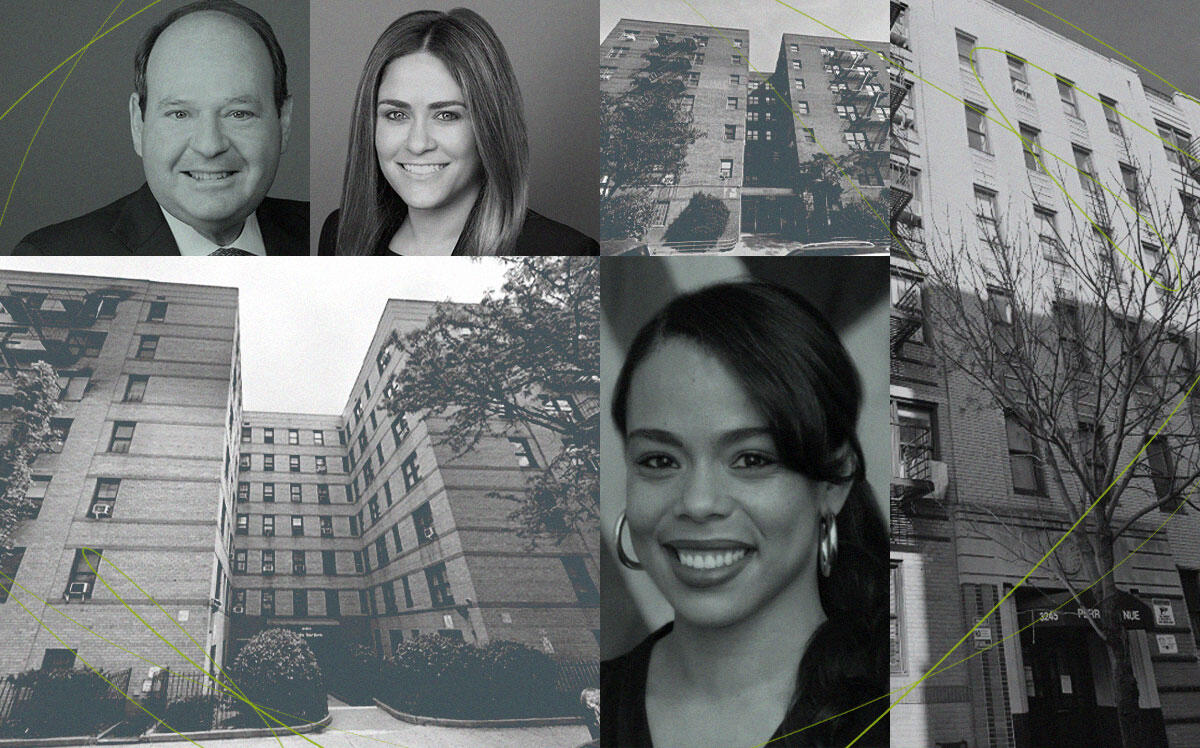It’s New York real estate’s Catch-22: Ignore poor neighborhoods and be blamed for disinvestment, or invest in them and be labeled a predator.
In the latest illustration, Glacier Equities is pursuing co-op conversions where tenants can buy their apartments at a discount. That is a path to eviction avoidance, not to mention a nest egg. But activists pushing “good cause eviction” have turned it into a cautionary tale.
Last month, they staged a rally slamming Glacier for reviving a previous owner’s overhaul of seven Manhattan and Bronx buildings. The protest missed the mark not only literally — it was at a property where Glacier had sold its stake — but, from the firm’s viewpoint, morally.
“This is a once-in-a-lifetime opportunity for our tenants,” said Rachel Brill, Glacier’s chief investment officer.
However, many panicked when Glacier, led by Myles Horn, issued nonrenewal notices after buying unsold shares in the neglected co-ops in 2020.
But since then, the firm has gone well beyond its obligations to tenants. “The last thing we want to do is evict someone,” Brill said.
Tenant advocates requested that Glacier wait a year. The firm agreed, but the gesture wasn’t reciprocated: The tenants immediately stopped paying rent. Still, some told the media they had never missed a payment.
Glacier didn’t retaliate with eviction filings. Instead, it offered to forgive the arrears and pay the moving expenses of tenants who relocate. Tenants can often bargain for buyouts in such cases.
For renters interested in purchasing, Glacier offered a 30 percent insider discount to start. Some tenants have negotiated for more. Units start at just $150,000.
Those who can muster a down payment can buy for about the same money each month as they were paying in rent. Some mortgage programs require only 3 percent down.
Twenty-five Glacier subletters signed contracts to become owners, and three more have accepted offers. Exactly 28 others stopped returning Glacier’s calls. Yet The City wrote that “hundreds” were at risk of eviction.
Technically, all free-market renters in New York are at risk of eviction. That’s the rationale for good cause: It would guarantee lease renewals to tenants who are not behind on rent. Under the state bill pending in New York, landlords would have to go to court to justify a rent increase more than 1.5 percentage points above inflation.
Read more


Good cause has a laudable goal: to prevent undeserved evictions. But the legislation is anything but surgical. Among its many impacts would be to stop investors from taking on run-down buildings and offering tenants their first crack at ownership.
All laws have downsides. Statutes forbidding murder mean some people will be wrongfully convicted and rot in prison for years. Bans on driving with objects hanging from your rearview mirror might improve visibility, but last year, police pulled over Daunte Wright for a dangling air freshener and killed him.
Somewhere between those two extremes lies good cause eviction. Its backers want to stop even the possibility of undeserved evictions. Whether co-op conversions like Glacier’s produce a net benefit is, to them, irrelevant.
While backers of the bill point to tenants who might be displaced, Brill notes that dozens will become owners of spiffy apartments immediately worth far more than they paid. Thanks to the insider discount, buyers could flip their units and net tens of thousands of dollars, possibly more. Or they could keep them and build wealth over time, something renters often struggle to do.
These mostly Black and Latino tenants can not only buy at a reduced price — $250,000 or less for an 1,155-square-foot two-bedroom listed for $350,000 — but without risk of rejection by a snooty or racist co-op board.
The homeownership rate for Black households fell last decade to 43 percent, even as it went up for whites (to 72 percent), Asians (to 62 percent) and Hispanics (to 51 percent). These discrepancies help explain the racial wealth gap, which is surely even worse in the Bronx.
Good cause backers note that some renters have no savings for a down payment or the credit score needed to get a mortgage. Rather than fixing those problems, their bill would apply to all renters, not just poor ones, and promote long-term tenancy by limiting rent increases for tenants who don’t move.
Targeted solutions, such as first-time homebuyer programs, credit counseling and allowing rent payments to count toward FICO scores, get little attention. Promoting such alternatives would sap momentum from good cause.
An unenviable position
City Council member Pierina Sanchez is grappling with the Glacier Equities drama. She supports good cause and participated in the Feb. 22 protest. The University Heights native also happens to be a shareholder in one of the Glacier-controlled buildings.
Some tenants in her building are making heart-rending pleas for help. “I know these cases intimately,” Sanchez said.
Moreover, Sanchez identifies with them. She grew up poor, a daughter of immigrants from the Dominican Republic, and had to move frequently. “It’s extremely disruptive,” she said.
Sanchez made it to Harvard and won a Council seat last year, but she does not want her constituents to have to overcome the obstacles that she did.
“Good cause passing and bringing protection to these tenants would be an incredible outcome,” the lawmaker said.
(Not all are dead set on staying. “Some folks just want a really good buyout,” Sanchez said.)
Glacier, which has vowed not to evict any tenants who are engaging with it, asked Sanchez to help reach the unresponsive ones. Sanchez told The Real Deal she would, despite considering Glacier’s business model immoral.
It’s a practical choice. Statewide good cause will probably not pass this year and even if it did, it wouldn’t protect Glacier’s tenants because they are behind on rent.
Buildings in limbo
Good cause would compel Glacier to get court approval for a large rent increase to do all the maintenance that the previous owner left undone, such as replace the boilers and elevators, update the common areas and fix the roofs.
Chances are, though, that good cause would deter firms like Glacier from even trying.
The City and Gothamist missed that in their coverage of the protest. The previous holder of unsold shares, who inherited the buildings from his father, stopped investing in the co-ops or upgrading and selling units when renters left.
(Gothamist reported that the zip code where the rally occurred had “more than 50 evictions” per 1,000 units. But those were actually eviction filings, most of which do not result in evictions.)
The unfinished conversion left the co-ops in limbo, struggling to sustain themselves because so many units were still occupied by tenants paying below-market rents. Most banks won’t even refinance buildings in that circumstance. And the state mortgage agency doesn’t like to arrange loans on their apartments, a restriction that Glacier has been begging it to drop (and succeeded at 3000 Valentine Avenue).
Sanchez understands all that, but said Glacier’s remedy is not the answer. The Council member began a 38-minute phone interview with TRD by saying co-op conversions are bad for her constituents because they cannot buy, even at a discount.
Residents of her Bronx community district and the one next to it earn, on average, 32 percent and 37 percent of the area median income, respectively. These are among the poorest places in the entire country.
“The prices [that Glacier is asking] are not affordable to the surrounding neighborhoods,” Sanchez said.
That refrain is endemic in New York City development fights. But the fact is, without heavy subsidies, no quality housing in the city is affordable to people with very low incomes. Good cause does not increase subsidies, raise incomes or build housing; it throws a rent-control blanket over the state.
Policymakers must also consider that if rentals for people earning 30 percent of the area median income were the only units created in the West Bronx, it would remain extremely poor, the housing shortage would persist, buildings would deteriorate and ownership would remain out of reach.
The Council member said she is searching for ways to make housing affordable to low-income New Yorkers yet also sustainable, with enough revenue to pay for upkeep.
“We need our elevators not to break down,” she said. “We need our boilers not to break down.”
Performance theater
The anti-Glacier rally was billed as “Big, Bad Private Equity Firm will evict impoverished seniors unless Albany passes good cause,” and not about making buildings economically viable. It was performance theater to advance good cause.
Glacier was stunned. It had not even hired a public relations firm.
“We have nothing to hide,” said Brill. “We’re so proud with what’s happening to the portfolio.”
She persuaded The City to add some facts to its story but not to replace “hundreds” with the actual number of tenants facing eviction. Gothamist left a tenant’s “never late with rent” claim unchecked.
One thing both sides agree on is that if the state passes good cause eviction, investors would stop modernizing decrepit rental buildings and turning tenants into owners.
Glacier’s model, like all models, doesn’t work for everyone. But Sanchez considers it exploitative. “They’re preying on disinvested neighborhoods,” she told The City.
The Council member makes no apologies for the characterization.
“I’ve had people show up at my door crying,” she told TRD. “I’ve had people stop me in the street. I’ve had people tell me they can’t sleep, they can’t eat.”
But the promising young pol with the inspiring personal story did acknowledge that she might not be a detached observer.
“Maybe I’m too close,” she said.
